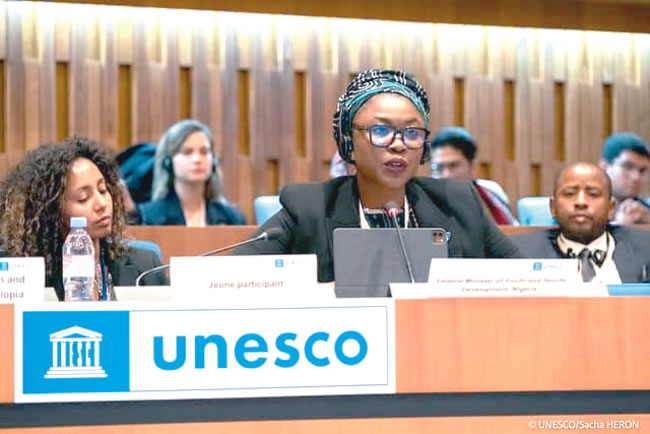The Federal Government has muted a plan to adopt a youth-led initiative as part of its efforts to tackle the challenges of climate change, especially concerning the impact on the youth.
Minister of Youth Development, Dr Jamila Ibrahim, made the disclosure at the 13th edition of the UNESCO Youth Forum held at the ongoing 42nd UNESCO General Conference in Paris, France.
Ibrahim noted that in Nigeria, climate change has impacted negatively on land and water resources leading to conflicts, agricultural disruptions, and displacement of communities.
She added that those who bear the consequences the most are the youth who constitute about 70% of the Nigerian population, which is the largest youth population per country in the African continent and 10% of the global youth population.
At the conference, which had more than 250 youth forum participants and 33 youth ministers in attendance, Ibrahim also articulated President Bola Tinubu’s emphasis on the need to support developing nations with essential financial resources, technical know-how, and technology to transition into the green economy.
She further underscored the president’s stance on fostering global collaboration to empower developing countries in their efforts to combat climate change while advancing economic development.
“It is our youth population who bear the brunt of this challenge the most, and it is the youth who also hold the key to innovative solutions,” she said.
The minister further revealed President Bola Tinubu’s commitment to enhance youth climate action in Nigeria by empowering youth participation through engagement by involving them in discussions with stakeholders and policymakers, focusing on young people at the grassroots level, and adopting a bottom-up approach to climate action.
Other efforts, according to Ibrahim, include engaging with young people in border communities, addressing their marginalisation and the specific impacts of climate change they face, investing in youth-led initiatives by providing skills and financial support to those already involved in climate interventions while building the capacities of emerging ones, implementing educational and policy-building programmes to further climate awareness and action and also promoting inclusive policies, and fostering international partnerships for collaborative efforts.
According to UNESCO, the voices, ideas, and actions of the youth must inform and shape how the social impact of climate change is tackled both at the national and global levels.
The purpose of the UNESCO YOUTH FORUM is to facilitate ideas, enthusiasm, and creativity among youth leaders, youth ministers, and UNESCO.
READ ALSO FROM NIGERIAN TRIBUNE






